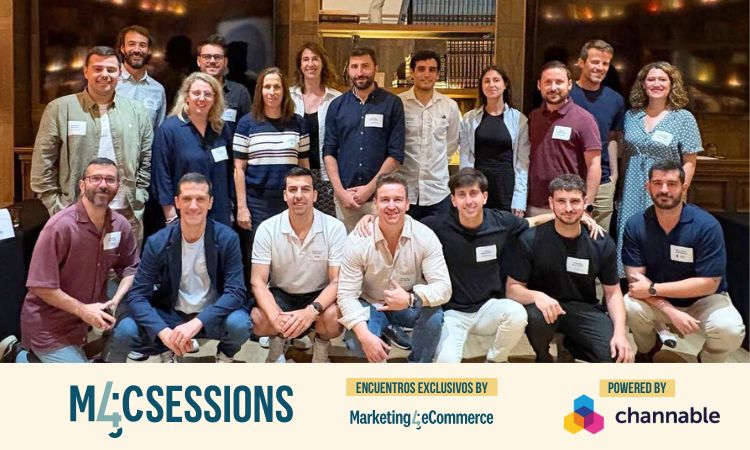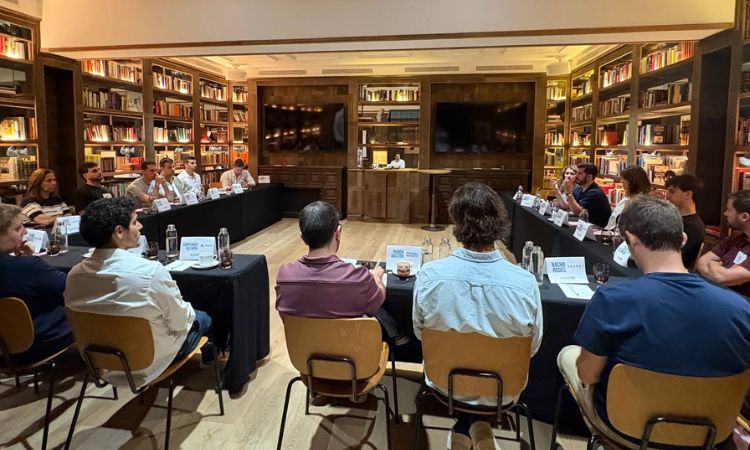
On June 5, we lite 16 professionals in the sector to celebrate the 16th edition of our M4C Sessions at the Pulitzer hotel in Barcelona. This private meeting had as its central theme the «PPC strategies that make a difference»allowing us to discuss and explore different points of view about the current situation of digital advertising and how factors such as AI or giants such as Google or Meta are molding it.
On this occasion, the day has been promoted by our friends from Channable.
PPC strategies that make a difference: challenges in a changing panorama
Rubén BastMarketing 4commerce director was in charge of moderating the session in which they participated 16 outstanding figures of the digital sector:
Valeria CortiHead of Paid Media de Roi Up
Nacho RodésCEO & Founder of Digital Rocket
Natalia SampérizCEO & FOUNDER DE SEMMANTICA
Adrián PonceUser Acquisition Lead of Product Hackers
Gonzalo PistoiaResponsible for Wuala business development
Jaime SánchezBig Seo Coo
Anna SerranoHead of Go-To-Market Strategy for praise
Sergio OrdonezCO FOUNDER by The Roi Makers
Josep DeulofeuSeo Head & Visibility Manager
Sergio ErasoWanatop Social Ads
SERGI DairyRodanet CEO
Esther CamañesCo Founder of Rigel Media
Adrián AlcaideCEO de Roas Hunter
Esteban AlmansaHead of AI, Data & Tech for Marketing Spain & Latam of Making Science guests
Amadeo SalcedoChannable Executive Account
Santiago AlfaroChannable Executive Account
One thing is clear, and our guests corroborated it: Digital agencies are at a time of forced reinvention. The growing disintermediation driven by giants such as Google and Meta, now accelerated by the emergence of generative artificial intelligence, puts in check the traditional role of agencies in the advertising chain.

1. MEANS OPERATIVE, MORE STRATEGY
The first big challenge is evident: The purchase of media is “comfortable”. The platforms seek that the advertiser manages everything directly inside his ecosystem, reducing the space for intermediaries. This forces agencies to focus on Add value in what is not replicable by a machine: strategy, creativity and lateral thinking.
In this scenario, agencies that depend almost exclusively on digital advertising operation must diversify If you want to remain competitive. This is where the need for a change of mentality In the teams: many profiles have been formed to execute, not for think strategically.
2. The danger of blindly trusting the platforms
Another critical aspect that was addressed is trustor rather, the lack of it towards platforms like Google and Meta. The more control they have, the easier they find it to increase prices without necessarily offering the advertiser.
In this sense, a particular warning was launched on Googledescribed as an “injured animal”: For the first time, he is threatened by a technology that calls into question his hegemony and business model while they need to give positive data to their shareholders in the very short term.
This change in the rules of the game and its need to offer short -term results to its shareholders, can cause the giant to make more aggressive decisions (Price increases, skip intermediaries to capture a greater portion of the advertising cake, etc.), Without really supposing a benefit to the advertiser.
3. The like threat … and as an opportunity
In front of this panorama, The AI also opens doors. Despite the belief that “AI does everything,” that is not true, the reality is that it does not replace the experience, intuition or strategic vision. In fact, the AI release operating time that can be reversed in added valuein addition to serving as a source of training and inspiration for teams. In addition, new needs and roles that agencies must cover will continue to emerge.
As indicated successfully during the session: “AI is a mirror: it gives you what you are, but enhanced”. That is, the more the professional who uses it knows, the better the results will be. New advertising opportunities for purchase of media within these tools are even glimpsed, such as advertising in Chatgpt.
4. Manual manufactures and instinct recovery
Another of the most commented points was the Haretazgo with Google automated campaignslike PMAX. Many attendees acknowledged being Returning partially or totally to a more manual managementverifying that the results improved and controlled control over key decisions to be able to extract more key conclusions of their performance.
In this sense, a combination that convinces seems to be rely on automation toolslike Channable feeds, but Without giving up human control about information and strategy.
5. The future: more strategic and multidisciplinary teams
The vision of the future that was projected is clear: Less technicians, more strategists. Agencies must form equipment with a solid marketing base, not only focused on the “Paid”, capable of offering multiservice services. This includes from Fulfillment or point of sale, to internationalization or creativity, areas still little explored by many digital agencies.
Finally, the need to work soft skillsfrom the ability to call a client to recover intuition. «You have to recover instinct, intuition; There the AI still has a lot to learn «.
![5 challenges in digital advertising in an era in which the AI corroles to Google [M4C Sessions]](https://www.logitechgamingsoftware.co/wp-content/uploads/thumbs_dir/startups-south-summit-r6x5ifnqs7n5ippgv3jxuolt4bwo9bect4df5d97p8.jpg)
![5 challenges in digital advertising in an era in which the AI corroles to Google [M4C Sessions]](https://www.logitechgamingsoftware.co/wp-content/uploads/thumbs_dir/td_696x0-qohpzceajsjzbnh8dr4gn0a94fm7nyujn53rb5ssho.png)



